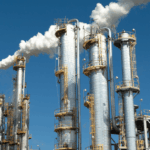Biodiesel Fuel
Biodiesel fuel (also called diesel biodiesel or simply biodiesel), is a renewable and clean-burning diesel. Classified as an advanced biofuel by the Environmental Protection Agency (EPA), biodiesel reduces greenhouse gas emissions by 57 percent to 86 percent, compared to petroleum diesel, and also reduces U.S. dependence on petroleum imports.Biodiesel is a fuel typically made from soybean, canola, or other vegetable oils; animal fats; and recycled grease. It can serve as a substitute for petroleum-derived diesel or distillate fuel. For EIA reporting, it is a fuel composed of mono-alkyl esters of long chain fatty acids derived from vegetable oils or animal fats, designated B100, and meeting the requirements of ASTM (American Society for Testing materials) D 6751.
Worldwide production topped 35 billion litres in 2020. Indonesia is the top country by biodiesel production in the world. As of 2019, biodiesel production in Indonesia was 137.86 thousand barrels per day. The top 5 countries also includes the United States of America, Brazil, Germany, and Argentina. Biodiesel’s clean-burning properties appeal to environmentally aware consumers. Wyoming’s Beartooth Basin Summer Ski Area announced that as of June 2018, it will become the first ski area in the U.S. to operate all lifts on biodiesel. Initially, the equipment will run a blend of 20 percent locally produced biodiesel and 80 percent regular diesel, increasing up to a possible 100 percent biodiesel, depending on how the generator performs under changing weather conditions.
Large renewable energy and biochemical consulting firms like LEC Partners will certainly have experts in biodiesel fuels and other renewable fuels. They also offer a wide range of services in the general areas of biofuels, biochemicals, biotechnologies, biomaterials, synthetic biology commercialization, feedstocks, and hemp/cannabis, and will have many specialized business and financial services like due diligence, feedstock availability, grants and loans and bio market research. A big consulting group like this should also offer technical and engineering related services like techno economic analysis, environmental evaluations, feasibility studies, risk analysis and expert witness engagements, and have solid strategic partnerships in place to assist clients with insurance, legal, accounting, plant fabrication, feedstock procurement.
With over 150 experts worldwide, LEC Partners has experts in many specific clean and renewable areas, including anaerobic digestion, fermentation, biomass, conversion technologies for things like tires and railroad ties, organic synthesis, fuel additives, ethanol gas, biodiesel fuel including algae biofuels, solid state and industrial fermentation, green energy grants, ag biotech, agricultural waste, alcohol fuels, alternative proteins and animal-free products, sustainable foods, beverage fermentation, biocatalysis, biodiesel conversion, biogas production, biomass power, carbon intensity, co2 utilization, combined heat & power, Fischer-Tropsch technology, food waste, hydrothermal carbonization, industrial enzymes, landfill management, microbial fermentation, organic synthesis, plastic pyrolysis, plastic recycling, plastic waste, pyrolysis oil, reactor design, renewable identification number, the Renewable Fuel Standard (rfs2), solid recovered fuels, torrefaction and torrefied biomass, waste to energy, and waste-to-hydrogen. This is a multidisciplinary group of green energy consultants that is a virtual “one stop shop” for any client need and handles projects of all types and sizes.
Look at our experts and the services we provide. Most of our experts are also available to advise and serve as expert witnesses in bioeconomy litigation matters. For the larger projects, we specialize in putting together full service, interdisciplinary teams with one point of contact. See video about LEC here. Call us at 1+ (501) 833-8511 or email us for more information.
Have some questions?
Not sure where to start?
Let's start a conversation. We're here to help you navigate
the bioeconomy with confidence.

